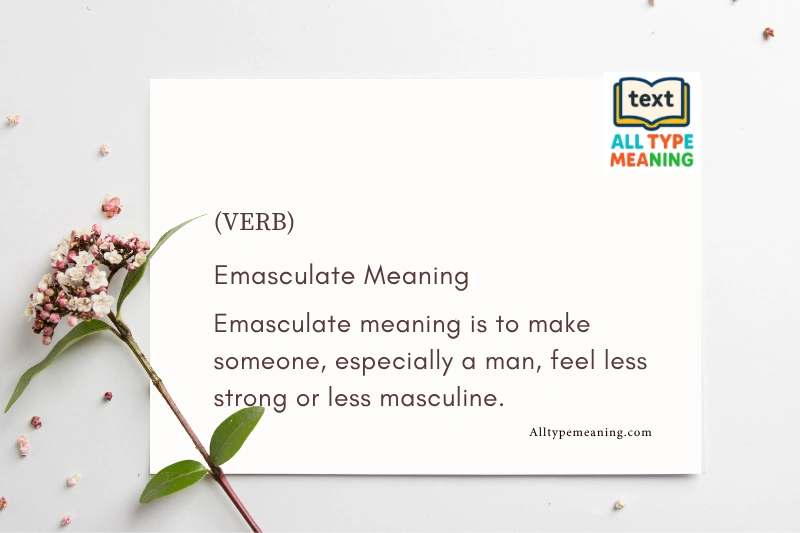Emasculate meaning refers to making someone, especially a man, feel less strong, confident, or masculine. It’s often used when someone’s pride, authority, or power is reduced, either emotionally or socially. Understanding this word helps students, professionals, and language learners express complex feelings and situations more clearly. In this article, we’ll explore the full meaning, usage, and examples of emasculate to help you use it confidently in everyday communication.
Table of Contents
ToggleQuick Stats: Emasculate at a Glance
| Attribute | Details |
|---|---|
| Word Type | Verb (transitive) |
| Syllables | 4 (e-mas-cu-late) |
| Origin Language | Latin |
| First Known Use | 1620s |
| Difficulty Level | Advanced |
| Common Contexts | Psychology, Politics, Literature, Gardening |
| Usage Frequency | Moderate (more common in formal writing) |
Word Definition: What Does Emasculate Mean?
Emasculate (verb): To deprive someone or something of strength, power, or vigor; to make weaker or less effective; to castrate or remove the male reproductive organs.
Pronunciation:
- Phonetic Spelling: ih-MAS-kyuh-layt
- IPA: /ɪˈmæskjʊleɪt/
Part of Speech: Transitive verb (requires a direct object)
Related Forms:
- Emasculated (past tense/adjective)
- Emasculating (present participle/adjective)
- Emasculation (noun)
- Emasculator (noun – one who emasculates)
Origin & Etymology: Tracing the Roots
The word “emasculate” has a fascinating journey through linguistic history:
Latin Origins: The term derives from the Latin word emasculatus, the past participle of emasculare, which means “to castrate” or “make effeminate.” This breaks down further into:
- e- (ex-): meaning “out” or “away”
- masculus: meaning “male” or “masculine” (diminutive of mas = male)
First Known Use: The word entered the English language around the 1620s, initially used in its literal biological sense related to castration. Over time, its usage expanded to include figurative meanings related to weakening or reducing effectiveness.
Historical Evolution: By the 18th century, writers began using “emasculate” metaphorically to describe anything stripped of its power or vigor—from laws and policies to writing styles and artistic works. This metaphorical usage has become the more common application in modern English.
Detailed Usage: Understanding Different Contexts
1. Figurative/Metaphorical Sense (Most Common Today)
To weaken, undermine, or deprive of strength, force, or effectiveness.
Common Applications:
- Political/Legal Context: Describing policies or laws that have been weakened
- Example: “The amendments emasculated the original bill.”
- Personal/Psychological: Reducing someone’s confidence, authority, or sense of power
- Example: “The constant criticism emasculated his self-esteem.”
- Artistic/Literary: Making creative work less powerful or impactful
- Example: “Heavy editing emasculated the author’s bold vision.”
- Business/Organizational: Weakening an institution’s effectiveness
- Example: “Budget cuts emasculated the department’s capabilities.”
2. Literal/Biological Sense
To castrate or remove male reproductive organs from an animal or person.
Context: Veterinary medicine, animal husbandry, historical medical procedures
- Used less frequently in modern discourse
- Often replaced by clinical terms like “castrate” or “neuter”
3. Botanical/Horticultural Sense
To remove the stamens (male reproductive parts) from a flower, typically for plant breeding purposes.
Context: Gardening, agriculture, botanical studies
- Technical usage among plant breeders and horticulturists
- Prevents self-pollination to control cross-breeding
Grammar Notes:
- Always transitive: Requires a direct object (you emasculate something/someone)
- Passive voice common: “The law was emasculated by the amendment”
- Collocations: Often paired with words like “completely,” “effectively,” “systematically”
Synonyms & Antonyms: Expanding Your Vocabulary
Synonyms
| Synonym | Meaning |
|---|---|
| Weaken | To reduce strength, power, or effectiveness |
| Debilitate | To make someone or something very weak |
| Enervate | To drain of energy or vitality |
| Undermine | To gradually weaken or damage something |
| Cripple | To severely damage or impair functionality |
| Enfeeble | To make weak or feeble |
| Diminish | To reduce in size, importance, or intensity |
| Impair | To weaken or damage something |
| Devitalize | To deprive of vitality or effectiveness |
| Castrate | To remove testicles; weaken severely (literal/figurative) |
Antonyms
| Antonym | Meaning |
|---|---|
| Strengthen | To make stronger or more powerful |
| Empower | To give authority, confidence, or strength |
| Fortify | To make stronger or more secure |
| Invigorate | To give energy, strength, or vitality |
| Bolster | To support or strengthen |
| Energize | To give energy or enthusiasm to |
| Reinforce | To strengthen or support with additional material |
| Enhance | To improve quality, value, or effectiveness |
| Amplify | To increase strength, size, or importance |
| Vitalize | To give life or vitality to |
Words That Look Similar (But Different Meanings!)
Be careful not to confuse “emasculate” with these similar-looking words:
- Immaculate: Perfectly clean or free from mistakes (nothing to do with emasculation!)
- Emaciate: To make abnormally thin or weak from lack of food
- Matriculate: To enroll at a college or university
- Ejaculate: To eject or discharge suddenly (biological/verbal sense)
Example Sentences: Seeing It in Action
- Political Context: “Critics argued that the numerous compromises emasculated the climate change legislation, leaving it toothless and ineffective.”
- Personal/Psychological: “His controlling manager constantly emasculated him in front of colleagues, undermining his confidence and authority.”
- Literary/Artistic: “The film adaptation emasculated the novel’s dark themes, transforming a gritty story into a sanitized, family-friendly movie.”
- Historical: “The Treaty of Versailles was designed to emasculate Germany’s military capabilities after World War I.”
- Botanical: “The horticulturist carefully emasculated the flower before introducing pollen from the desired parent plant.”
- Business/Organizational: “Years of underfunding and bureaucratic restrictions emasculated the regulatory agency’s ability to enforce standards.”
- Educational: “The professor felt that the new standardized curriculum emasculated teachers’ ability to respond to individual student needs.”
Common Mistakes & Tips: Using “Emasculate” Correctly
Frequent Errors:
1. Spelling Mistakes:
- ❌ “Emasculate” (missing the ‘c’)
- ❌ “Emasculate” (double ‘s’)
- ✅ Emasculate (correct spelling)
2. Confusing with “Demasculate”: While “demasculate” exists, it’s far less common. “Emasculate” is the standard, widely recognized term. In searches for “emasculate vs demasculate,” you’ll find that emasculate is the preferred and correct form in virtually all contexts.
3. Using it Intransitively:
- ❌ “He emasculated after the incident.”
- ✅ “The incident emasculated his confidence.”
4. Inappropriate Context: Avoid using this word carelessly in casual conversation as it can be considered offensive or insensitive, particularly when discussing gender or masculinity issues.
Pro Tips for Correct Usage:
- Context matters: Consider your audience before using this word—it’s more appropriate for formal or academic writing
- Consider alternatives: In sensitive discussions, words like “weaken,” “undermine,” or “diminish” might be more appropriate
- Be specific: When possible, explain HOW something was emasculated for clearer communication
Cultural & Contextual Insights
Literary Significance:
“Emasculate” frequently appears in literary criticism and analysis. Critics use it to describe how adaptations, translations, or censorship can weaken the original work’s impact. Classic examples include discussions of how Victorian-era publishers emasculated controversial novels.
Gender Discourse:
In modern discussions about masculinity and gender roles, “emasculate” can be a contentious term. It’s important to recognize that:
- The word’s etymology is rooted in gendered concepts of power
- Contemporary usage often extends beyond gender to describe any weakening of power
- Some activists critique the term for reinforcing problematic gender norms
Political and Legal Contexts:
Politicians and legal scholars frequently use “emasculate” when discussing legislation:
- “The opposition emasculated the bill through amendments”
- This usage emphasizes the dramatic reduction in effectiveness
Regional Usage:
While understood globally in English-speaking countries, “emasculate” is more common in:
- Academic and formal writing (U.S., U.K., Australia)
- Legal and political discourse
- Less common in everyday casual conversation
Tips to Remember & Learn This Word
Memory Tricks:
- Etymology Connection: Remember “mas” = male in Latin. Think of removing (“e-” = out) the male strength (masculine power).
- Visualization: Picture a sword being dulled or broken—its power literally taken away.
- Word Association: Connect with “mascot” (both share “masc” root related to male/strength).
- Mnemonic: Every Mighty Army Seems Crippled Under Legislation Adopting Timid Edicts
- Practice Sentences: Create your own examples using current events or personal experiences.
Related Words & Word Families
Understanding related terms expands your vocabulary naturally:
Same Root Family:
- Masculine (adjective): Having qualities traditionally associated with men
- Masculinity (noun): The quality or condition of being masculine
- Masculinize (verb): To make masculine in appearance or character
- Emasculation (noun): The act or process of emasculating
Conceptually Related:
- Effeminate: (adjective) Having characteristics regarded as typical of a woman
- Virile: (adjective) Having strength, energy, and strong sexual drive (opposite concept)
- Potent: (adjective) Having great power, influence, or effect
- Impotent: (adjective) Unable to take effective action; helpless
Modern Usage & Slang Evolution
Contemporary Trends:
In the digital age, “emasculate” has found new contexts:
- Social Media Discourse: Discussions about toxic masculinity and gender norms frequently reference emasculation, though often critically examining the concept itself.
- Business Jargon: Tech companies and startups use it to describe disruption: “The new app emasculated traditional retail models.”
- Gaming Culture: Gamers might say a patch “emasculated” a powerful character or weapon (made it much weaker).
- Meme Culture: While not typically “memed,” the concept appears in discussions about confidence and self-esteem online.
Evolving Sensitivity:
Modern writers increasingly consider whether “emasculate” is the most appropriate word choice, especially when discussing:
- Personal empowerment issues
- Gender identity topics
- Professional setbacks
Alternative phrases like “stripped of power,” “rendered ineffective,” or “significantly weakened” may be preferred in sensitive contexts.
Reader Interaction: Share Your Experience!
Now that you understand “emasculate” thoroughly, consider these questions:
- Have you encountered this word in books, news articles, or conversations? What context was it used in?
- Can you think of a situation where something was “emasculated”—perhaps a project at work, a sports team’s strategy, or a movie adaptation?
- Do you feel confident using this word in your own writing now?
Challenge: Try using emasculate correctly in a sentence today and share your experience! Understanding the Emasculate meaning can truly enhance your communication skills and word power.
Conclusion:
The Emasculate meaning to make someone or something weaker, less confident, or less powerful, particularly referring to men. It comes from the Latin word emasculatus, which originally meant “to castrate,” but now it mainly describes a decline in emotional, social, or professional strength.
This term is commonly found in politics, literature, psychology, and business. Knowing the meaning of emasculate aids in clearly conveying concepts related to a loss of strength or effectiveness in both formal and figurative situations. Discover the ultimate guide to the Vivarium Meaning.
1. What is the exact emasculate definition?
Answer: Emasculate means to weaken or deprive something/someone of power and effectiveness. It also literally means to castrate or remove stamens from flowers.
2. Is there a difference between “emasculate vs demasculate”?
Answer: “Emasculate” is the correct standard term. “Demasculate” is extremely rare and non-standard. Always use “emasculate.”
3. Is “emasculate” considered offensive?
Answer: It’s appropriate in formal/academic writing. However, when discussing personal or gender topics, use alternatives like “undermine” or “weaken” to avoid offense.
4. Can “emasculate” be used for women or gender-neutral subjects?
Answer: Yes! Despite its etymology, it now applies to anyone or anything that has been weakened, regardless of gender.
5. What’s a simple way to remember “emasculate”?
Answer: Think “strip away power.” Formula: Subject + emasculates + object. Example: “The law emasculated workers’ rights.” Don’t forget the ‘c’ in the spelling!
Discover the RNTCP full form at All Type Full Form.

